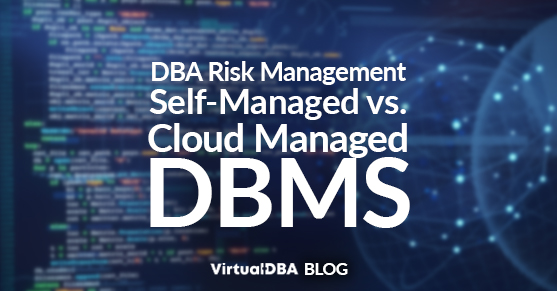Database Administrators (DBAs) play a critical role in safeguarding both self-managed and cloud-managed database management systems (DBMS). While the specific risks and challenges differ between the two environments, the core responsibilities of a DBA remain essential in mitigating threats. This blog post will compare and contrast the DBA’s role in managing risks for self-managed and cloud-managed DBMS, highlighting the unique challenges and opportunities presented by each.
DBA Risk Management: Self-Managed
The DBA has extensive control over the database infrastructure in a self-managed DBMS environment. Their responsibilities include:
- Physical security: Protecting hardware and data centers.
- Network security: Safeguarding network infrastructure.
- System configuration: Optimizing database settings.
- Patch management: Applying updates and fixes.
- Backup and recovery: Implementing robust backup strategies.
- Personnel security: Protecting against insider threats.
DBAs in self-managed environments must deeply understand hardware, networking, and operating systems. They are responsible for the overall health and security of the database infrastructure.
DBA Risk Management: Cloud-Managed
In a cloud-managed DBMS environment, the DBA’s focus shifts towards data management, performance tuning, and security within the cloud platform. Their responsibilities include:
- Cloud provider security assessment: Evaluating the cloud provider’s security controls.
- Data residency and sovereignty: Ensuring compliance with data regulations.
- Access control: Managing user permissions and access levels.
- Data encryption: Protecting data at rest and in transit.
- Incident response: Collaborating with the cloud provider during security incidents.
While DBAs still play a crucial role in cloud-managed environments, their focus is more on data and application management than infrastructure.
Comparing and Contrasting DBA Roles
| Feature | Self-Managed DBMS | Cloud-Managed DBMS |
| Infrastructure Control | High | Low |
| Security Focus | Hardware, network, and system configuration | Data, access, encryption |
| Skill Set | Technical expertise in hardware, networking, and OS | Data management, cloud platforms, security |
| Collaboration | Internal IT teams | Cloud provider, internal IT teams |
The Role of XTIVIA Virtual-DBA
Whether an organization uses a self-managed or cloud-managed DBMS, XTIVIA’s Virtual-DBA team can provide invaluable support. Our experts deeply understand both environments and can help organizations address their specific challenges.
For self-managed DBMS:
- Expert database administration services
- Security assessments and remediation
- Disaster recovery planning and testing
- Performance optimization
For cloud-managed DBMS:
- Cloud migration planning and execution
- Cloud security assessments and compliance
- Performance optimization in cloud environments
- Data protection and recovery strategies
XTIVIA’s Virtual-DBA team offers comprehensive services to help organizations manage database risks effectively, regardless of the deployment model. By leveraging our expertise, organizations can optimize database performance, enhance security, and ensure business continuity.
Please contact us for more information.

